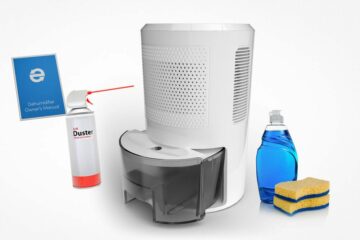Have you ever wondered what causes humidity? If you have ever lived in the subtropics like Florida, or currently live there, then you would know that on certain summer days you’d walk outside and get hit by extreme heat and a thick column of soupy air that immediately leaves you uncomfortable and damp. That soupy-quality is a product of humidity, and there can be a whole lot of it. But what is humidity?
What is Humidity?
Humidity, in a basic sense, is the measurement of water vapor in the air. Water vapor is the gaseous form of good old H2O or water. When water is heated, H2O molecules escape into the air to form water vapor. It is this water vapor that enters the immediate atmosphere, joining the masses of other air molecules. When the water vapor content of the air becomes high, then the result is that muggy, uncomfortable feeling the air takes on.
The humidity mentioned above is actually relative humidity, one of the many ways that moisture in the air is measured. There is also absolute and specific humidity as well, each having its specialized use.
Meteorologists, on the other hand, use dew-point temperatures to measure the amount of moisture in the air. The dew-point temperature is the point at which the air becomes saturated with moisture, causing dew droplets to form. This is demonstrated by the dampness on the exterior of a cool drinking glass on a hot, humid day. The dew-point temperature is determined when the atmosphere around the glass cools, allowing water droplets to condense on the outside of the glass. The same effect is happening when you see dew drops resting upon the grass on your lawn in the morning.
So if humidity is the measure of water vapor in the air then it begs the question of what causes the water to turn to vapor anyway?
Where Does Humidity Come From?

Since humidity is the measure of water vapor in the air then the question of how it increases is based on what most excites a molecule of water and we all know what does that: heat. Heat energizes all molecules and water is no exception.
So where does humidity come from?
As the water heats up, it converts into water vapor, harmlessly floating into the air. You see this in action whenever you put a pot of water on a hot stove. The water begins to bubble and boil and the steam rises above it. The rising steam from the pot is water vapor.
Now when it comes to the world outside, the main source of heat comes from the sun. The sun’s rays heat bodies of water, such as rivers, lakes, streams, and oceans, evaporating it and sending the water into the atmosphere. This is the beginning of the water cycle—the most famous of science lessons taught back in elementary school. With bodies of water playing an important part in the creation of water vapor, it only makes sense that a place such as Florida, near the equator and full of water, would be massively humid.
Living in Humidity
You can’t walk more than two feet without hitting a lake in Florida, and you can’t walk more than an inch outside your door without being hit by the unbearably muggy air. But other places in the south also are hot, and humid—including Georgia, Louisiana, and Alabama. All across the board, wherever there is a body of water, you can expect on some hot day there to be a thick plume of humidity hanging low over the land.
Now that we know what causes humidity outside, what about inside?
Presumably, your A/C unit is dehumidifying the air inside your house but sometimes it’s never enough. Of course, a lot of humidity that enters a home can be from the outside world. The hot summer months have plenty of humidity to give. Barging through your front door and slipping through small cracks, but it isn’t the source of all your house’s humidity. When performing physical activities indoors you tend to build up some sweat that evaporates into the air. When cooking, especially boiling, you are releasing lots of water vapor into the air and many more activities might increase the humidity of your home.
What Causes High Humidity do to a Home?

While high humidity outside can be annoying and uncomfortable, it can wreak havoc inside the house. High humidity can present a myriad of problems within a home. Where there is high humidity there tends to be bacteria, mold, and mildew. And remember the example of the cold glass water droplets sliding down the outer glass? The same effect can happen to the windows of a home, possibly dripping down onto wooden objects, and damaging them in the process.
No matter where you choose to live, you can’t escape water vapor. With humidity being a financial and health risk, the air conditioner just isn’t going to cut it alone. Therefore, it is wise to invest in a dehumidifier to protect your home from the effects of humidity, such as rust and spoiled foods.
At Eva-Dry, we offer a series of dehumidifiers for your home, office, gun safe, RV, and more. Take control of your atmospheric pressure by purchasing one of our unique dehumidifiers.



